Student Blog
Life Hacks
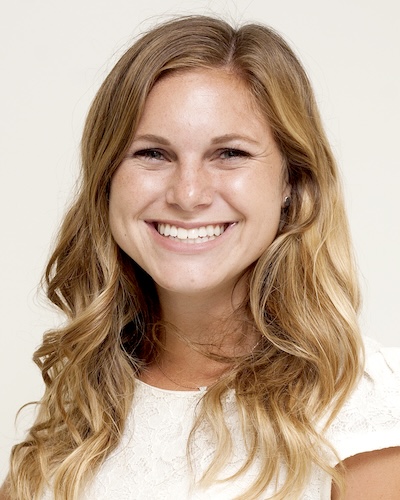
From Undergrad to Grad life ⟩
September 18, 2017, by Ali
Getting Involved Life Hacks Living in LA
Although I am a second year in the graduate program, I technically completed my undergraduate degree in May 2017. Therefore these first few weeks of classes have been full of transition and adjustment from living on the University Park Campus to living on the west side of Los Angeles and commuting to the Health Science Campus. Here are some things I have learned:
- Moving to a new neighborhood in a familiar city
This is my fifth year living in Los Angeles, but this is my first time living off campus in an apartment. I live in Culver City, which is a thirty minute drive from the Health Science Campus. This change of neighborhood has provided me the opportunity to find all new running routes, coffee shops for studying, and even a favorite laundromat. This move has opened up a whole new side of Los Angeles to my life. - The value of a planned social life
Moving off campus means that I now live on average fifteen to twenty minutes away from my friends. I can no longer just drop by my friend’s apartment unannounced or walk to the library together late on a Sunday night. I have quickly learned the necessity that is planning in advance to go out to dinner or try a new ice cream shop with a friend. These things cannot be as spontaneous as they used to be, but that just means I get to have something fun on my calendar to look forward to. - The abundance of USC hosted graduate student events
In just the first few weeks back to school, I have already seen the benefits and fun of being a graduate student. I went to the occupational therapy and physical therapy tailgate for our first football game. It was an easy way to be social with classmates as well as the physical therapy students, who we share a lunch patio with. I love that all the graduate school students have just as much Trojan pride as my undergraduate friends. I also attended a Los Angeles Dodgers game for five dollars organized by Graduate Student Government. There are always fun events for graduate students to opt into! - Everything we learn is valuable and relevant
One aspect of graduate school that has only been solidified over the past few weeks upon returning from level II fieldwork, is just how relevant all of our coursework is to our future practice. Regardless of what area we specialize in or get advanced practice in, the Chan Division of Occupational Science and Occupational Therapy has created a curriculum that molds us into generalists of the field of occupational therapy. Each course has its own value. Readings and assignments are all important because they are informing and building our occupational therapist lenses. It is motivating to know everything we are doing in and out of the classroom is valuable. - Classmates in graduate school have a lot in common
Finally, as some of my undergraduate friends have moved away and out of Los Angeles, I have become closer with graduate school occupational therapy classmates. It is wonderful to be a part of a program that has students with diverse interests and backgrounds. We are all so different while simultaneously have a common interest entering a profession centered around helping people live their healthiest and happiest lives. Lunchtime is always a good time with the occupational therapy students.
⋯
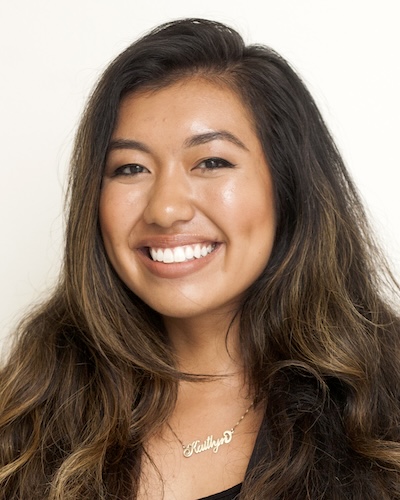
Work, Work, Work, Work . . . Balance in Grad School ⟩
September 15, 2017, by Kaitlyn
Life Hacks School/Life Balance
With everything in life, I like to be all in. Thus, when I entered graduate school I knew that I wanted to dedicate every possible ounce of myself to the experience of being an OT student (because hey, you’re only an OT student for so long!). With the responsibility of being an involved student, however, also comes the responsibility of taking time for yourself and embracing the concept of: WORK-LIFE BALANCE. It is absolutely essential to our health and well-being, especially in graduate school.
Work-life balance is still a work in progress for me, and I think it is something that will continue to be a work in progress, as life itself is so fluid. Here are a few basic things that I’ve learned along the way — via classes at USC and also through personal experience — that have helped me have a decently balanced life thus far:
Time management is key
I personally keep a color-coded planner that I can write in and also a Google calendar synced to my iPhone. I quite literally do not know how I would live my life without the two because they both keep me in check. For both, I make sure I write things down by the hour because it allows me to see the breakdown of my day and where there is time for what. I also color code by classes (pink), work (blue), social (purple), and school-affiliated events events (orange) so that I can see exactly how balanced my week is. By color-coding, I can also see if I’m maybe working myself too hard and need to wedge out a time to see my family or friends (it also just makes the calendar more aesthetically appealing to be honest).
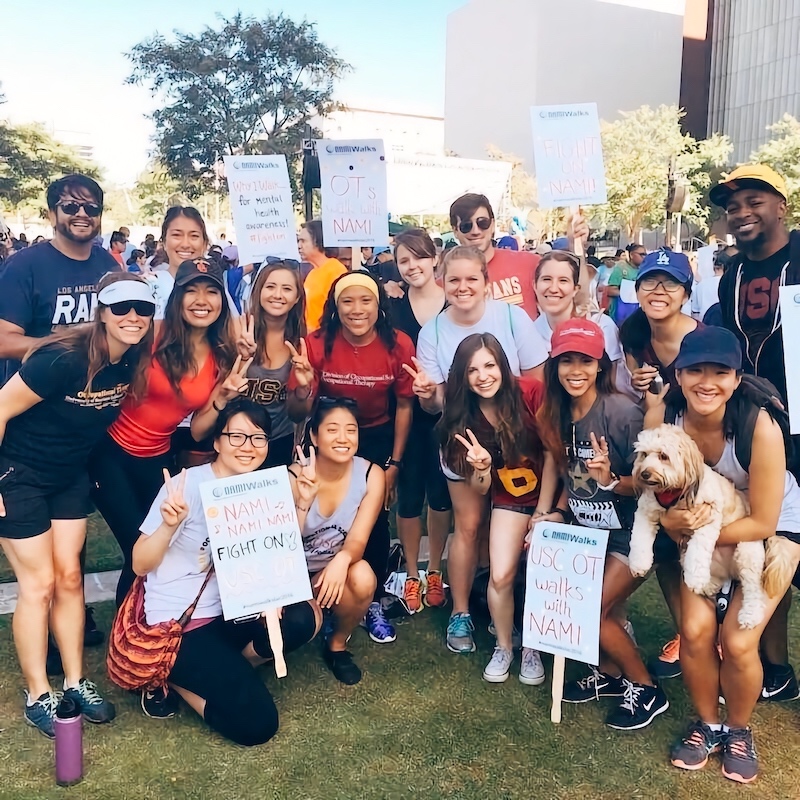
Participating in NAMIWalks LAC to help raise funds, combat stigma, and promote awareness about mental health at Grand Park in DTLA!
Prioritize your schoolwork and work on it when you have free parts in your day (even if they’re small!)
It may be 30 minutes before meeting a friend for dinner or 2 hours in between events. I am always surprised at how much I can accomplish even in 10 minutes.
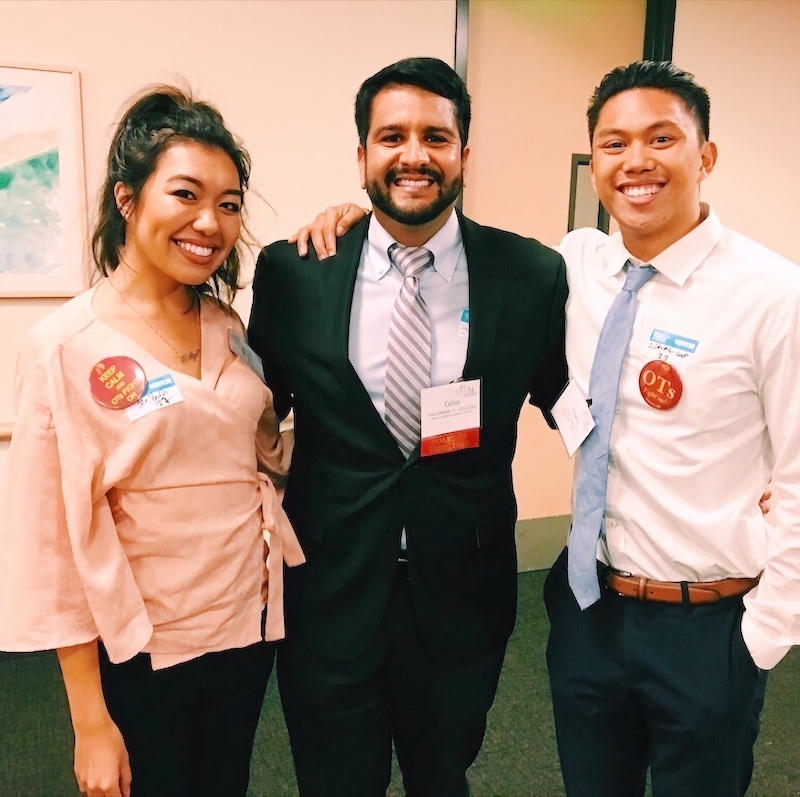
Working at the 2017 OTAC Legislative Reception hosted at Children’s Hospital Los Angeles with Region 2 Director, Dr. Delgado, and fellow OTAC Student Delegate, Erwin.
Invest time in things that matter to you
Basically: engage in your meaningful occupations! For me, that’s a lot of things: it means going to a new coffee shop, going to OTAC events to advocate for the profession, taking pictures, spending time with people in the program (i.e., at our OT/PT tailgates and football games), reading a good book, going on a hike, exploring different places around LA, and so on. I just make sure that whatever it is, it is something I genuinely find enjoyment in and contributes to the betterment of myself.
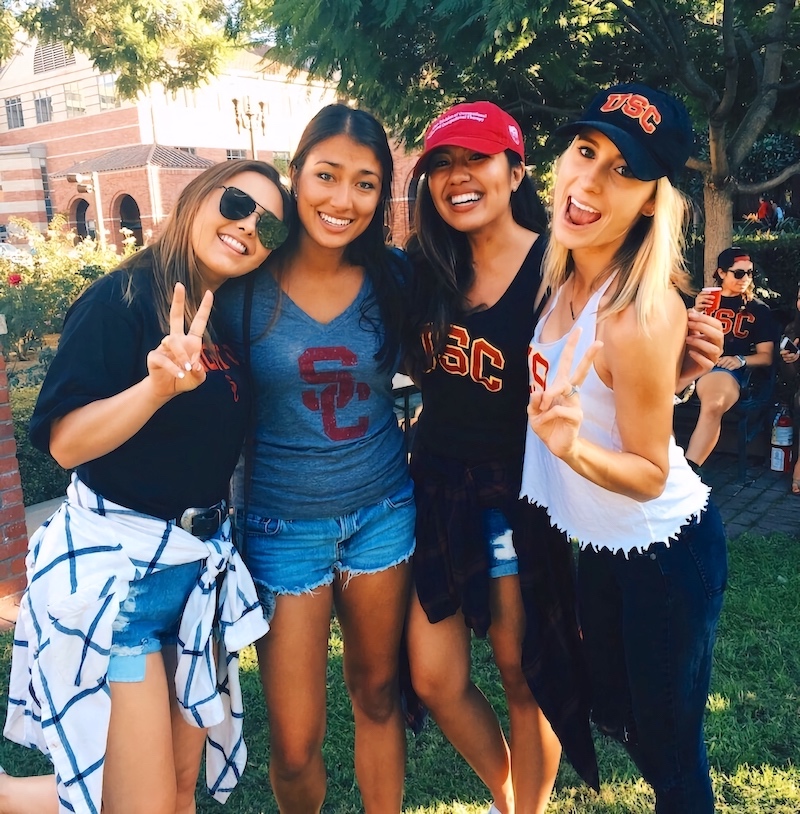
Fighting on at our OT/PT tailgates on UPC campus!
See people you actually want to see
It’s true that life can get busy in grad school. What I’ve found, however, is that there is always time for the people you care about when you make the effort. Therefore, I make sure that a lot of my free time is spent with my family and friends even if I can only spare a few hours in my week. A few hours is better than nothing. On a serious note though, nothing releases oxytocin and reduces stress like having a “Frozen” sing-along with my 4-year-old niece and 2-year-old nephew.
Take time for yourself
This concept is something I am constantly grappling with because I love being on the go at all times and also have an embarrassing case of “fomo” (fear of missing out). Most recently, I’ve been spending about 15 minutes each night writing at least 3 things I am grateful for everyday in my gratitude journal. Writing in my gratitude journal has been the perfect form of taking time for myself because it allows me to be able to spend time with my thoughts while also ending my day on a positive note. Even though it’s only 15 minutes, it’s still better than nothing!

Drinking tea is an ultimate de-stressor!
As previously mentioned before, work-life balance is a work in progress! Some weeks are more balanced than others and work-life balance means different things to different people, but what is important is that you’re striving for YOUR best quality of life along the way. Good luck and happy balancing!
⋯
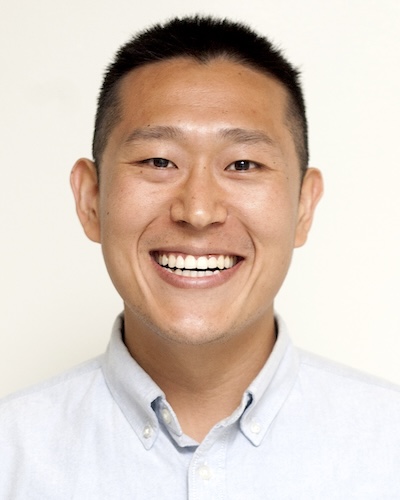
Checking in at 13/26 ⟩
September 14, 2017, by Bryan
Life Hacks
From being dropped into the deepest end of the pool with five days a week of Kinesiology and Neuroscience, grasping for air trying to stay afloat completing that final GATE/PICO for Quantitative, to finally gaining some tread as my feet are able to touch the ground near the end of FW Level 2 this summer, it feels like I have been swimming nonstop since June 2016. As I enter into my second year of the program, I definitely wanted some time to step out of the pool, reflect, and share a few lessons learned before starting my final lap (unless I do the OTD!).
- The faculty genuinely cares about your overall wellbeing. Coming from a large public school, I was much more familiar being another warm body in a 500-person lecture hall, often opting to just listen to a video lecture online. I was taken aback walking down the halls of CHP and being greeted by name from almost every faculty member. It was the first time in my educational career where professors spent time asking how we were all doing and how they could better communicate the lecture material to promote our understanding. With that said, it was the first time our midterm and final student feedback evaluations contributed to the future organization and direction of the courses. Lesson: If you have questions about anything from the material in lecture, what to pursue in the future, or even random advice about life, the faculty are always willing to listen and be there.
- I was listening to the Harvard Business Review podcast earlier this week and they were presenting a claim that the key factor setting professional athletes, top-performing CEOs, and entertainers apart from others was their mentality, not necessarily their skill level. HBR argued that everyone can achieve a certain skill level but after that comes the need for a particular mindset. I felt the truth of this podcast throughout my fieldwork experiences where it was my fear of failing that hindered me as opposed to an objective lack of knowledge. Whether I was walking the floors of an inpatient acute rehabilitation unit or working on Handwriting Without Tears at a private pediatrics clinic, I was always conscious of messing up. Zooming out a bit, I realized that I was actually completely prepared with the clinical mindset and know-how for every scenario I was placed into, I just needed to take a breath and use the knowledge I was taught. Lesson: Study hard and do not be scared to apply it!
- One of the most fun and interesting things I took part in last year was hanging out with the students who visited from South Korea through Global Initiatives. It was so cool to see how OT was practiced and taught in another country and how, in the end, we were united by our passion to simply help others. I learned how to describe OT in Korean to better communicate it to my parents. The most fun part was getting Facebook Friend Requests randomly throughout the semester from students who visited USC. Lesson: OT is so global, start exposing yourself to the profession on an international scale. (Maybe it will help you plan for the externship in the Spring!)
Rounding the first corner of Fall semester, it has been really nice to peek over my shoulder at the hurdles I have jumped so far while keeping my gaze fixed on the hurdles to come. But, maybe the biggest lesson to remember is to enjoy the race altogether.
⋯
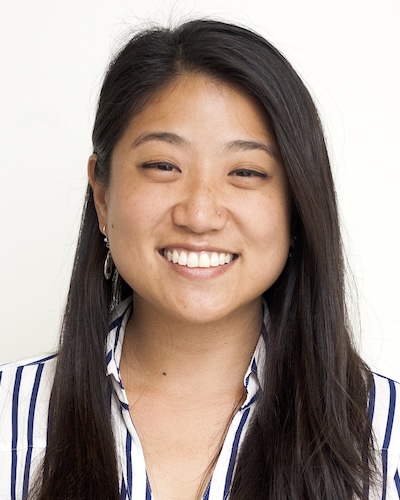
No OT to shadow? No worries! ⟩
September 6, 2017, by Erika
Fieldwork Life Hacks
To those of you who are currently in or still need to complete the mental health immersion, this blog post is for you. Many of you have concerns about not having an OT to shadow during your level I due to the limited number of mental health facilities that have OTs available. That’s a fair concern, I had the same one! Fear not, I’m here to say that I had a great experience in my level I even without an OT to shadow. It took a bit of a perspective shift but once I was able to allow the experience to reveal itself naturally, what I ended up gaining exceeded any expectations and fears I had going in.
During my first fieldwork placement during my first year, I was placed at Verdugo Hills Hospital’s geriatric psychiatric unit called Stepping Stones. I had the opportunity to observe both inpatient and outpatient settings which was quite a privilege. As with most mental health settings, there was no OT to shadow. Therefore, I was placed under the supervision of two recreational therapists and an art therapist in the inpatient unit as well as two social workers in the outpatient unit.
Here is what made my mental health experience so valuable even without an OT to shadow:
- I learned what professions are already well established in mental health, what they do, and how OT can provide additional value. Before this fieldwork, I didn’t know much about mental health. I just assumed that if someone had mental health issues, they’d see a psychologist. Through this fieldwork, I had the opportunity to observe interventions done by recreational therapists, an art therapist, and social workers and how they played their parts in assisting patients across the progress of their illness. I learned that in art therapy, you would choose mediums (markers vs. paints vs. colored pencils) according to the patients’ cognitive levels and abilities as well as the psychological significance of certain colors! I learned that social workers have the authority to diagnose and observed how they engaged clients in group talk therapy. Best of all, I was able to execute OT sensory and cognitive interventions and inform the other professions on what value we could bring to what they were already doing. It was a beautiful exchange of thought across professions and a shared passion of service to this population.
- I was able to get exposed to all mental health settings through the experiences of my peers and in turn, reduce stigma that I personally associated with mental health. Since there are few OTs to shadow, mental health is the only immersion in which weekly fieldwork debriefs are set up with peers and a faculty member during class time. I think that most of my classmates would agree that this served as being one of the most helpful resources. We were placed with the same group all semester in which each member was placed in a different mental health setting so we got firsthand experiences of what each setting entailed. What a way to learn! It provided an open platform to not only share in each other’s concerns and successes but gave us a deeper lens into the mental health community. These debriefs equipped us with awareness and compassion, and in turn, helped debunk any stigmas that we initially came into the course with.
- USC faculty support is top notch. Even with the lack of OT in my settings, there was never a time that I didn’t feel supported by USC faculty. With such breadth of experience, you are bound to find a faculty member that has practiced in the setting you’ve been placed in (inpatient, outpatient, full service partnership, wellness center, clubhouse, etc.). I was able to reach out to faculty members and pick their brains about possible interventions to try out, success stories, horror stories, etc. just to feel a bit more comfortable in understanding OTs role in my specific setting. This experience opened doors to forming relationships with faculty who I now see as mentors that I feel comfortable reaching out to for guidance throughout school and my future career.
- Developing my therapeutic use of self. Even without an OT, this fieldwork placement was a great opportunity to observe the variance in how my supervisors, as therapists, utilized their own therapeutic uses of self. Everyone has their own gifts, ways of communicating, and backgrounds that contribute to how they practice and work with clients. It was fascinating to see how one recreational therapist Carl*, who I called the Zen master, would engage patients vs. another, Yuko*, who was bubbly and charismatic. They were so different and yet, their concern and care for every patient was expressed and equally well received. This made me really reflect on the fact that there is no one way to be a successful therapist. I began to observe my own therapeutic use of self and develop my own style of practice utilizing my own authentic experiences and gifts.
I know this post was a bit of a big boy but thank you for reading. Hopefully, I’ve been able to alleviate some fears or at least provide a change in perspective on what else you could look forward to during your level I mental health fieldwork placement. At the end of the day, with all your fears, questions, or concerns, know that there is faculty close by, peers going through the same thing, and new and interesting perspectives that lie untapped with your supervising mental health professionals that might provide more insight into your own value and practice with this population. Level I placements are meant solely as a means to observe so OPEN YOUR EYES — you may be surprised by what you end up learning.
*All names mentioned in this blogpost are pseudonyms.
⋯

Back to School Again ⟩
September 4, 2017, by Ali
Life Hacks
One way in particular that makes the Chan Division of Occupational Science and Occupational Therapy so unique is the Professional Program Course Sequence. As a Bachelor’s to Master’s student, I have had limited time out in the field as most of my life up to this point has been spent in the classroom. With level I fieldwork imbedded in our coursework each semester I have been exposed to pieces of occupational therapy that are exciting and eye-opening, but in the midst of exams, quizzes, group projects, presentations, and research papers at times over the last year I felt distant from the profession I know I will love.
This summer changed everything. With level II fieldwork I fell in love with occupational therapy on a whole new level. I was placed at a private practice in Half Moon Bay, California. My first day of fieldwork I was so nervous and anxious about what the next twelve weeks would have in store, but upon walking into the clinic I knew that I was in the right place. My site was a home converted into a pediatric speech and occupational therapy practice with families waiting in the living room. I learned more about using myself as a tool for therapy, what it means to be family centered, and the ins and outs of running a private practice than I thought possible.
Throughout my twelve weeks I transitioned from shadowing my clinical instructor to treating her full caseload. I completed treatment plans, interventions, and progress notes. Through projects assigned to me by my clinical instructor such as an in-service, case study, research projects, and readings I was able to maintain an evidence based practice and ensure I was providing the best treatment possible for my clients.
I have come back to school rejuvenated feeling more confident in my abilities as an occupational therapist and know that I will soon be working in a clinic that I love, where day in and day out I am helping my clients live their happiest and healthiest lives. I am now ready for another year of school in order to get there!
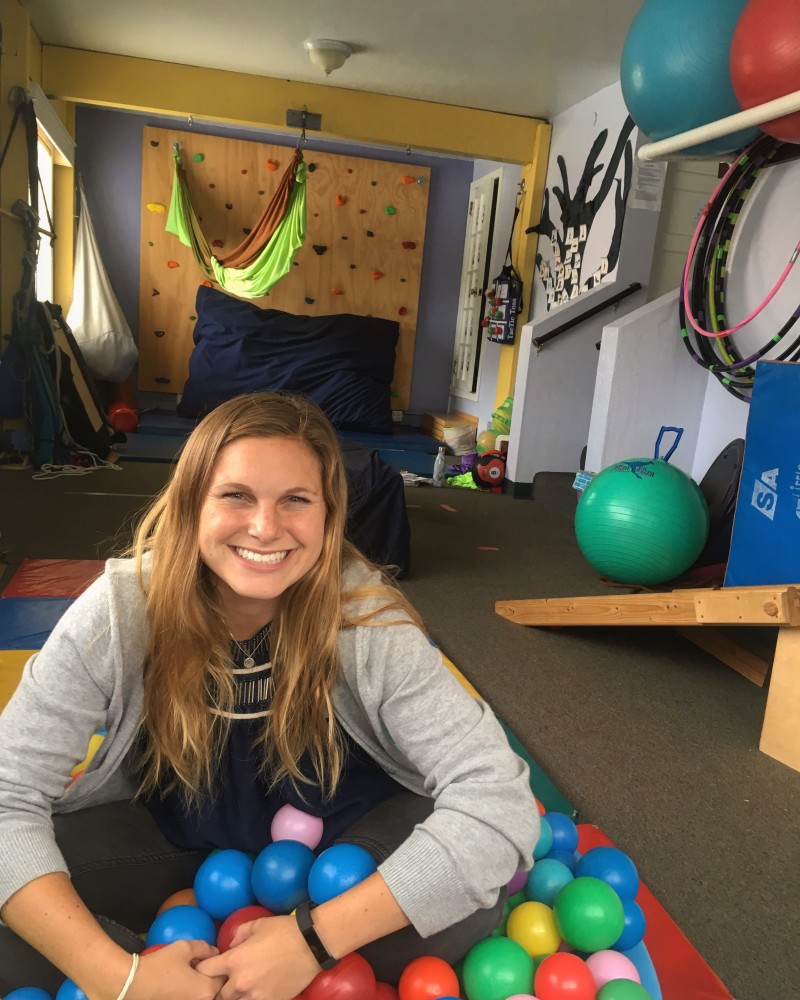
⋯





